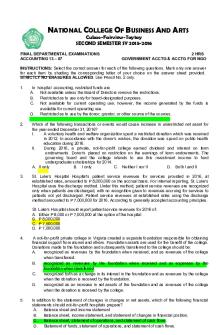In the article Blue Collar Brilliance author Mike Rose’s main point is that jobs that are stereotyped as low PDF

| Title | In the article Blue Collar Brilliance author Mike Rose’s main point is that jobs that are stereotyped as low |
|---|---|
| Author | Fae Rivers |
| Course | Psychology Of Play |
| Institution | Full Sail University |
| Pages | 1 |
| File Size | 26.6 KB |
| File Type | |
| Total Downloads | 95 |
| Total Views | 127 |
Summary
psycology week 2 essay...
Description
In the article Blue Collar Brilliance author Mike Rose’s main point is that jobs that are stereotyped as low-status actually require a different or a learned intelligence that society overlooks. The article begins with author Mike Rose speaking about his experience growing up in the restaurant his mother worked in. He describes the nuances of working as a waitress he observed such as the lingo his mother used for abbreviated orders, and seating area nicknames. Further into the article the author goes on to talk about how his mother would use her job as a waitress to learn and practice dealing with a variety of people and their sociological natures. Following up with a brief history of his family’s education and upbringing including his mother, her siblings, his father and Mr. Rose himself. Rose then states “Intelligence is closely associated with formal education “and how easily society subscribes to the “Belief that work requiring less schooling requires less education” He goes on to speak about his experience with one of his uncles who worked in a factory. Mr. Rose quotes his uncle Joe “ It was like schooling” in that the factory was a place where he was constantly learning. In the concluding articles Mr. Rose goes on to state how over the next eight years he began to study the thought processes involved with the aforementioned low-status type of work that his mother and uncle did. He catalogued the cognitive demands of the jobs to gain a sense of how knowledge and skill develops. What Mr. Rose writes was that “Work-related actions become routine with experience, they were learned at some point through observation, trial and error and often, physical or verbal assistance from a co-worker or trainer.” Mr Rose ends his article by stating, “If we believe everyday work to be mindless, then that will affect the work we create In the future. When we devalue the full range of everyday cognition, we offer limited educational opportunities and fail to make fresh and meaningful instructional connections amount disparate kinds of skill and knowledge.”...
Similar Free PDFs

Summary - Blue-Collar Brilliance
- 1 Pages

Blue-Collar Brilliance
- 2 Pages

Blue Collar Brilliance step 5
- 2 Pages

Friendship in That 70s Show
- 4 Pages
Popular Institutions
- Tinajero National High School - Annex
- Politeknik Caltex Riau
- Yokohama City University
- SGT University
- University of Al-Qadisiyah
- Divine Word College of Vigan
- Techniek College Rotterdam
- Universidade de Santiago
- Universiti Teknologi MARA Cawangan Johor Kampus Pasir Gudang
- Poltekkes Kemenkes Yogyakarta
- Baguio City National High School
- Colegio san marcos
- preparatoria uno
- Centro de Bachillerato Tecnológico Industrial y de Servicios No. 107
- Dalian Maritime University
- Quang Trung Secondary School
- Colegio Tecnológico en Informática
- Corporación Regional de Educación Superior
- Grupo CEDVA
- Dar Al Uloom University
- Centro de Estudios Preuniversitarios de la Universidad Nacional de Ingeniería
- 上智大学
- Aakash International School, Nuna Majara
- San Felipe Neri Catholic School
- Kang Chiao International School - New Taipei City
- Misamis Occidental National High School
- Institución Educativa Escuela Normal Juan Ladrilleros
- Kolehiyo ng Pantukan
- Batanes State College
- Instituto Continental
- Sekolah Menengah Kejuruan Kesehatan Kaltara (Tarakan)
- Colegio de La Inmaculada Concepcion - Cebu











